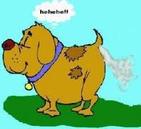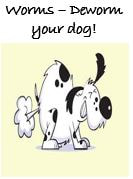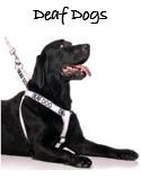FLATULENCE
BY KELLY SPERLING (M.TECH (HOM))
Help for those 'smelly' times!

Flatulence is distension of your dog's stomach or intestines with gas or air. Flatus, commonly referred to as "gas" is the gas expelled from the body opening, usually the anus.
Gas production or build-up in the gastrointestinal tract is normal. Excessive production may not be indicative of any particular disease or disorder. However, in certain gastrointestinal diseases of dogs, the normal production of gas may be increased and excessive flatulence may result. Nearly all gastrointestinal gas comes from either swallowed air (aerophagia) or from air produced by bacterial fermentation and processing of ingested nutrients. Any condition that leads to increases in these gases can cause flatulence.
Flatulence can be benign and short lived, such as when a dog overeats or ingests food it is not used to. Flatulence can also be recurrent, chronic, and/or representative of a significant underlying disease. For this reason, persistent flatulence should not be ignored.
If the flatulence is increased and accompanied by either vomiting, diarrhoea, increased bowel sounds (borborygmus), loss of appetite or a visibly swollen abdomen, PLEASE SEEK VETERINARY ADVISE.
Causes
Feed your dog the best food that you can possibly afford. Find out from your vet which brand and type is the best suited for your dog’s age, breed and needs.
It's important to ensure that your dog has been checked for fleas and ticks, a dog with fleas and ticks will have a nervous disposition which can contribute to flatulence.
If you dog gulps down his food too quickly, he’ll be swallowing air as well as his dinner. Instead of feeding your dog 1 or 2 portions of food per day, divide the daily ration into smaller portions and feed the dog more frequently.
Reduce mealtime competition - When pets are fed together, one pet may eat too quickly to prevent the other pet from getting their food. Feeding your pets separately will allow them to eat in a more secure environment and therefore more slowly.
Raise the food dish – If your dog does not have to bend their neck so far down they will swallow less air. You can place the food bowl securely on a box or you can buy a stand that holds food and water at mouth level.
Cut out or drastically reduce treats and leftovers. Alternatively choose healthier and less gas producing treats. NEVER FEED YOUR DOG SPOILT FOOD.
Regular exercise aids digestion in general and helps to reduce flatulence. A simple walk within 30 minutes of eating can help move those gasses along more quickly, allowing him to release them outdoors where the odour is much less noticeable.
Supplements
Probiotics are the normal friendly bacteria present in our and our dog’s intestines. Due to lifestyle and food and infections, sometimes these friendly bacteria are depleted. This leads to increased flatulence. Adding a good probiotic to your dog’s diet can have tremendous benefits.
Activated charcoal has the ability to absorb and bind to toxins in the digestive system. It is also used to reduce excessive gas production.
Herbs
Cardamom is known as a digestive tonic that improves the appetite and stimulates circulation to the digestive system, helping to relieve nausea and vomiting. One of the oldest uses for Cardamom is for the relief of flatulence, grumbling and pain in the intestines associated with excess gas.
Chamomile is a soothing tonic that promotes good digestion. It is helpful in relieving stomach cramps as it has antispasmodic properties. Chamomile also has natural calming properties.
Fennel hasbeen primarily used to stimulate good digestion. It relaxes the smooth muscle lining of the digestive tract and has helped alleviate flatulence, food poisoning, motion sickness, nausea and vomiting. Fennel is an aromatic stimulant that is good for the gastrointestinal tract and helps to relieve gas pains, abdominal pain, colon disorders, gastrointestinal tract spasms, and also helps to expel gas.
Peppermint benefits the entire digestive tract. It is used to alleviate indigestion and the intestinal gas caused by certain foods. It relaxes the stomach muscles and promotes burping. Peppermint calms a queasy stomach and is good for nausea and vomiting. It is said to be especially calming for the lower bowel and has been helpful in relieving diarrhoea. Peppermint is also helpful in alleviating cramps due to its antispasmodic properties.
Homeopathy
Carbo-veg is indicated when the dog is fat and lazy and likes fresh air. Digestion is slow and the stomach may be distended. The flatulence has a very sour or putrid odour.
Lycopodium The dog will usually have weak and slow digestion. Lycopodium is indicated if there is bloating immediately after a meal, even a light meal. There is extreme flatulence. Symptoms worse between 4-8pm and usually at night.
Nux- vom is indicated in overindulgence, when the dog has eaten too much or had too rich food. There is a lot of flatulence and it can be sour smelling. The stomach may be very bloated and sensitive to touch.
Gas production or build-up in the gastrointestinal tract is normal. Excessive production may not be indicative of any particular disease or disorder. However, in certain gastrointestinal diseases of dogs, the normal production of gas may be increased and excessive flatulence may result. Nearly all gastrointestinal gas comes from either swallowed air (aerophagia) or from air produced by bacterial fermentation and processing of ingested nutrients. Any condition that leads to increases in these gases can cause flatulence.
Flatulence can be benign and short lived, such as when a dog overeats or ingests food it is not used to. Flatulence can also be recurrent, chronic, and/or representative of a significant underlying disease. For this reason, persistent flatulence should not be ignored.
If the flatulence is increased and accompanied by either vomiting, diarrhoea, increased bowel sounds (borborygmus), loss of appetite or a visibly swollen abdomen, PLEASE SEEK VETERINARY ADVISE.
Causes
- Aerophagia (swallowing air) occurs most often from eating quickly or gulping during eating.
- Diets that are high in soybean or fiber, spoiled food, and/or overeating, increase the amount of gas produced by the intestinal bacteria and increase the amount of flatulence.
- Dietary intolerance or allergy may cause gastrointestinal signs that include any combination of vomiting, diarrhoea, and flatulence.
- Malabsorptive disorders (diseases that cause difficulty absorbing nutrients) and maldigestive disorders (diseases that cause poor digestion of food) result in flatulence by altering bacterial fermentation and food processing.
- Inflammatory bowel disease (IBD) is an inflammation of the walls of the intestines. Vomiting, diarrhoea, flatulence, poor appetite, and weight loss are common clinical signs of IBD.
- Gastrointestinal cancer, such as lymphosarcoma and others may cause flatulence.
- Infections of the intestines with viruses, bacteria, parasites may increase gas production
- Constipation is the infrequent or difficult passage of faeces. It is occasionally associated with flatulence.
Feed your dog the best food that you can possibly afford. Find out from your vet which brand and type is the best suited for your dog’s age, breed and needs.
It's important to ensure that your dog has been checked for fleas and ticks, a dog with fleas and ticks will have a nervous disposition which can contribute to flatulence.
If you dog gulps down his food too quickly, he’ll be swallowing air as well as his dinner. Instead of feeding your dog 1 or 2 portions of food per day, divide the daily ration into smaller portions and feed the dog more frequently.
Reduce mealtime competition - When pets are fed together, one pet may eat too quickly to prevent the other pet from getting their food. Feeding your pets separately will allow them to eat in a more secure environment and therefore more slowly.
Raise the food dish – If your dog does not have to bend their neck so far down they will swallow less air. You can place the food bowl securely on a box or you can buy a stand that holds food and water at mouth level.
Cut out or drastically reduce treats and leftovers. Alternatively choose healthier and less gas producing treats. NEVER FEED YOUR DOG SPOILT FOOD.
Regular exercise aids digestion in general and helps to reduce flatulence. A simple walk within 30 minutes of eating can help move those gasses along more quickly, allowing him to release them outdoors where the odour is much less noticeable.
Supplements
Probiotics are the normal friendly bacteria present in our and our dog’s intestines. Due to lifestyle and food and infections, sometimes these friendly bacteria are depleted. This leads to increased flatulence. Adding a good probiotic to your dog’s diet can have tremendous benefits.
Activated charcoal has the ability to absorb and bind to toxins in the digestive system. It is also used to reduce excessive gas production.
Herbs
Cardamom is known as a digestive tonic that improves the appetite and stimulates circulation to the digestive system, helping to relieve nausea and vomiting. One of the oldest uses for Cardamom is for the relief of flatulence, grumbling and pain in the intestines associated with excess gas.
Chamomile is a soothing tonic that promotes good digestion. It is helpful in relieving stomach cramps as it has antispasmodic properties. Chamomile also has natural calming properties.
Fennel hasbeen primarily used to stimulate good digestion. It relaxes the smooth muscle lining of the digestive tract and has helped alleviate flatulence, food poisoning, motion sickness, nausea and vomiting. Fennel is an aromatic stimulant that is good for the gastrointestinal tract and helps to relieve gas pains, abdominal pain, colon disorders, gastrointestinal tract spasms, and also helps to expel gas.
Peppermint benefits the entire digestive tract. It is used to alleviate indigestion and the intestinal gas caused by certain foods. It relaxes the stomach muscles and promotes burping. Peppermint calms a queasy stomach and is good for nausea and vomiting. It is said to be especially calming for the lower bowel and has been helpful in relieving diarrhoea. Peppermint is also helpful in alleviating cramps due to its antispasmodic properties.
Homeopathy
Carbo-veg is indicated when the dog is fat and lazy and likes fresh air. Digestion is slow and the stomach may be distended. The flatulence has a very sour or putrid odour.
Lycopodium The dog will usually have weak and slow digestion. Lycopodium is indicated if there is bloating immediately after a meal, even a light meal. There is extreme flatulence. Symptoms worse between 4-8pm and usually at night.
Nux- vom is indicated in overindulgence, when the dog has eaten too much or had too rich food. There is a lot of flatulence and it can be sour smelling. The stomach may be very bloated and sensitive to touch.
|
Why we should be de-worming our dogs for our families sake!
This worm is transmitted to humans mainly by infected puppies and kittens who contaminate the areas that children play in with faeces; or by children playing with pets and inadvertently transferring the eggs into their mouths |
Dealing with Puppy Tantrums
Your little bundle of fluff may look cute throwing a tantrum, but stop it now - this is the start of a bad habit that could be dangerous |




